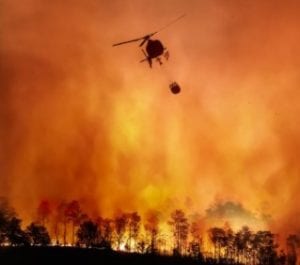Firefighter Safety
View video (8:38)
For over a decade, Google Research has been working to develop AI based wildfire detection and mitigation solutions to provide critical information for emergency responders and to help scientists researching how fires spread. This work led to the development of FireSat – a purpose-built constellation of satellites designed exclusively for wildfire detection and tracking. FireSat will give firefighters and researchers access to high-resolution imagery, updated every 20 minutes, and analysis by AI models optimized to detect wildfires 1/400th smaller than current early detection satellites. Together, with our partners in the fire community, we plan to launch the first satellite in early 2025.
View article.
A set of 435 severe injuries in wildland firefighters in the United States from 2019 to 2023 was classified by activity being performed, hazard encountered and injury severity. Statistical summaries were used to contextualize the data and to examine the frequency and severity of these injuries. Proportional odds models tested the impact of activity, region and fire complexity on injury severity. Aviation activities are associated with higher injury severity; there is no statistically significant difference in injury severity among other activities. Region and fire type do not impact injury severity. Injury frequency and severity vary among hazards and associated activities. Given the hazard mitigations in place, reducing injury frequency and severity may be challenging without clearly defined agency level risk tolerances.
View webinar recording (42:19).
With Jerry Tagestad, Pacific Northwest National Laboratory. Hosted by the Alaska Fire Science Consortium.
Working with NIFC and US Forest Service, PNNL has developed an automated fire line mapping system for the entire US. The system uses satellite imagery to map heat perimeter, intense heat, and spot fires. The fire line GIS data will be made available in the NIFC EGP system starting spring of 2025. This webinar will walk through the automated system for creating individual polygons and how these GIS data are published to EGP for access. We will also discuss the need for feedback to improve the accuracy of the resultant products.
View article.
Through interviews with wildland fire and forest managers (e.g., Incident Commanders, Agency Administrators, Fire Management Officers, and Fuels Planners) on seven western wildfire incidents during 2020 and 2021, we investigated how forest fuel treatments were utilized during firefighting. We found that treatments were considered and used during incidents in various ways, including to conduct burnouts, for direct modification of fire behavior, as access points for firefighters or equipment, or as components of contingency plans. Most interviewees said treatments provided additional options and flexibility in decision-making, enhancing both firefighter and community safety. For instance, treatments were used to reduce overhead hazards to firefighters and, in some cases, were prepared to serve as safety zones.
Webinar registration.
Learn about new geospatial data products to support wildfire planning and response including national fuel treatments, fire response districts and communities mapping.
Conference website
This International Wildland Fire Safety Summit and Human Dimensions of Wildland Fire Conference brings together wildland fire management agencies, Indigenous knowledge holders and experts, scientists, trainers, and other collaborators from around the world. This event focuses on wildland fire management, science, and knowledge-sharing through the lens of safety, protection, human behavior or engagement.
Important Dates and Deadlines
May 15: Call for Workshops closes
May 31: Call for Presentations closes
May 31: Registration opens
July 1: Presenters notified
August: Program finalized
September 27: Room block expires
September 30: Deadline for exhibitors to register
October 20-23: SS/HD Conference
October 24 -25: Field Trip to Banff National Park
View article.
Wildland fire is increasingly a consequence of the climate crisis, with growing impacts on communities and individuals. Wildland firefighters are critical to the successful management of wildland fire, yet very limited research has considered mental health in this population. Although a wealth of research in mental health risk and associated risk and protective factors exists for structural firefighters, unique demands of wildland firefighting such as the seasonal nature of work, the length and intensity of shifts, and the often geographically isolated working conditions, among other factors, require special consideration. The present review considers available literature on mental health in wildland firefighters, highlighting the importance of distinguishing occupation-related risks for firefighters from occupation-specific risks of wildland fire service work, and offers concrete evidence-based recommendations for future work in this high-priority research area.
View article.
This paper uses qualitative data from a long-term ethnographic research project. Data include detailed fieldnotes, semi-structured interviews, and agency documents, which were systematically coded and thematically analyzed. In addition to the triggering effects of fatality incidents and agency initiatives to change organizational culture, external factors also directly impact the development of firefighter safety policies and practices. These include sociodemographic, material, political, and social-environmental factors. Identifying and understanding the influence of multi-scalar external factors on firefighter safety is essential to improving safety outcomes and reducing firefighters’ exposure to hazards.
View factsheet.
While inconvenient for your average hiker or boater, major shifts in the weather can be deadly for firefighters. Longer and more intense fire seasons make accurate and timely weather predictions crucial to firefighter safety. To answer this need, the Fire Weather Alert System (FWAS) was developed by Jason Forthofer, Research Mechanical Engineer, and Natalie Wagenbrenner, Research Meteorologist, both from the Rocky Mountain Research Station’s Missoula Fire Sciences Laboratory. The FWAS is a mobile app that gathers weather data from many sources into a single convenient space and provides firefighters with individualized, easy-to-use, and timely weather alerts on their phones.






